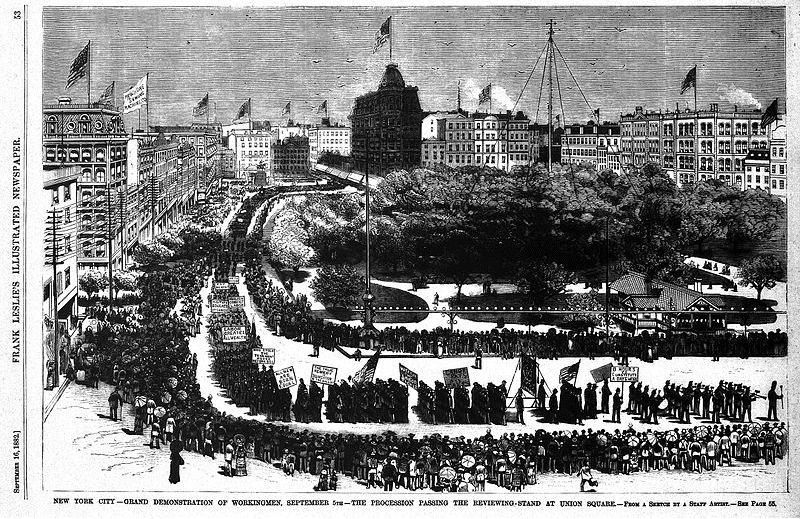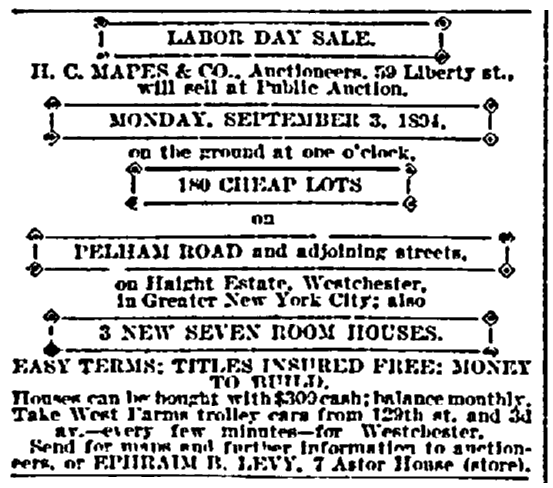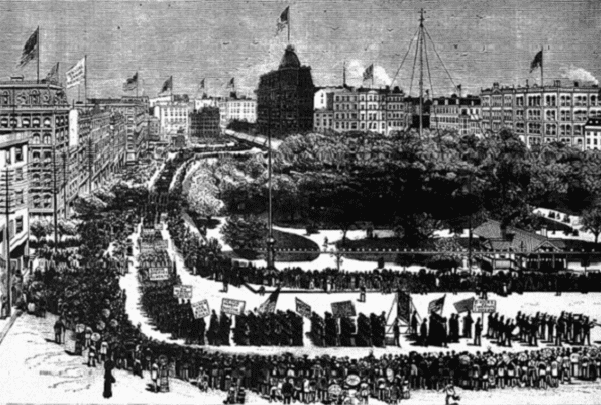Introduction: In this article, Gena Philibert-Ortega searches old newspapers to learn more about the holiday we’re about to celebrate: Labor Day. Gena is a genealogist and author of the book “From the Family Kitchen.”
What are you doing this Labor Day weekend? Labor Day has a long, interesting history, much of which has been largely forgotten. Labor Day is a day to honor workers and is “dedicated to the social and economic achievements of American workers.”*
Prior to its declaration as a federal holiday in 1894, Labor Day had been celebrated as a city and state holiday beginning in 1885. The advent of Labor Day coincided with important work issues facing Americans such as working conditions and safety, child labor, and long work hours. As those conditions have been addressed we’ve collectively forgotten the ongoing importance of this day, and to a certain extent even the origin of its meaning.

As you get ready for your day off this Monday, here are a few lesser-known facts about this holiday.
Let the Sales Begin!
To many people today, Labor Day means sales and some great bargains this weekend – but the notion of combining Labor Day with a good sale actually has a history almost as long as the holiday itself. The federal Labor Day holiday was enacted in June 1894 when Congress declared the first Monday of September to be Labor Day. Undoubtedly, retailers sensed an opportunity and that very September, newspaper ads for Labor Day sales appeared – including this one for “cheap lots” and “seven room houses” in New York.

In just a few short years, newspaper advertising for Labor Day sales had grown to large advertisements for all kinds of goods. I especially like this 1899 “Great Labor Day Picnic Sale!” advertisement that provides some history of the holiday and explains that the staff at Jones Dry Goods in Kansas City, Missouri, will be spending the day relaxing and not working – with full pay.
The top part of this ad reads:
It will be a royal bargain picnic. Labor Day is a legal holiday. This store observed the first one after the law was enacted and has observed every one since. Next Monday, September 4th, is the national holiday of Labor Day. On that day this store will not be open. On that day every boy, girl, man and woman in this store, from proprietor to door boy, will be turned loose to celebrate the holiday as they see fit – and their wages go on just the same. We’re going to have this big Labor Day Sale for two reasons: First is to sell all the goods we can, and, second, to educate our public – that swarms through this store each week – that Labor day [sic] should be observed the same as Fourth of July, Thanksgiving and Christmas. We want to educate our public that on this day the brain worker and the pick and shovel man, the stenographer in the great office buildings and the seamstress in the cottage, the proprietors of great industrial institutions and the armies of their employees should all – everyone – get out and enjoy this day of freedom from brain and muscular toil. To emphasize our belief in this doctrine of rest and recuperation we shall hold a six days’ carnival of cash bargain selling. You’ll find the things offered in this sale will be useful for the observance of this great September holiday.
This advertisement provides some useful social history and information about this business. Notice that it mentions children employees and that all employees will be provided a paid holiday. This sale “carnival” was a major event and included all types of merchandize including clothing, furnishings, “drugs and sundries.”
There’s More to Labor Day than the Monday Holiday
Labor Day is the first Monday of September but there’s more to the holiday than that one day. Labor Sunday, the preceding Sunday, was adopted by the American Federation of Labor and “dedicated to the spiritual and educational aspects of the labor movement.”**
For Labor Sunday, ministers were encouraged to speak on a topic relating to workers. That topic suggestion changed each year and, at least during World War I, incorporated events of the day – as this announcement for Labor Sunday 1917 shows.
That Sunday’s theme was “A Message for Labor Sunday in Time of War” which addressed labor problems created by the war. This newspaper article reiterates the purpose of the day as stated by Rev. Charles Stelize, Field Secretary for the Federal Council of Churches:
Just as Memorial Day and the several ‘birthdays’ show our appreciation of those who rendered patriotic service, and just as the churches’ ‘holy days’ do honor to those who serve mankind spiritually, so Labor Sunday is observed by the churches to honor the millions of toilers who serve mankind in the humbler places of life.
Labor Sunday sermons honoring workers, their contributions, and their struggles can still be heard in churches around the nation today.
Women’s Work
We often make the mistaken assumption that women in earlier generations didn’t work. Some women, especially younger women, the widowed, recent immigrants, and others had to work. Women were concerned about issues faced by workers and issues that targeted them because of their gender.
The importance of employment issues for women is illustrated in this 1913 newspaper article nestled amidst recipes, society news, and a romance story. Titled “Labor Created in Honor of Wage-Earners,” the article tells of suffragists working with labor groups, the importance of equal pay for equal work, the current membership of the Women’s Trade Union League (50,000 members), and advice about not burning your candle at both ends.
At one time, Labor Day was celebrated with picnics and parades. One of the groups who marched in those parades was suffragists. While not all labor leaders were supportive of women’s right to vote, many were. The right to vote and workers’ rights were two issues that many of our female ancestors were passionate about.
Your Ancestor’s Labor
Have you researched your ancestor’s work life? Were they a member of a labor union? Have you used old newspapers, such as GenealogyBank’s Historical Newspaper Archives, to learn more about that occupation or that union? We’d love to hear your stories in the comments section below.
Happy Labor Day!
———————————
* History of Labor Day. United States Department of Labor. https://www.dol.gov/general/laborday/history
** History of Labor Day. United States Department of Labor. https://www.dol.gov/general/laborday/history
